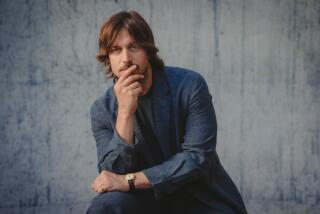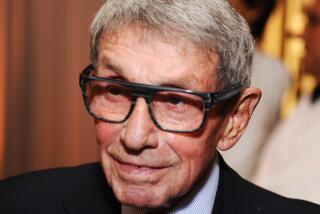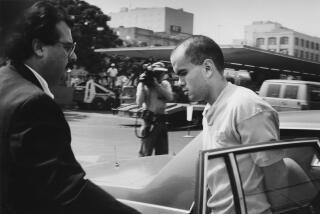The actor you didn’t know
Marlon Brando was different things to different people -- catnip to women, a director’s worst nightmare on set, champion of the underdog and the downtrodden.
For actress Penelope Ann Miller, the acting icon was a lovable goofball.
She recalls a dinner she had with costars Matthew Broderick and Bruno Kirby during the production of the 1990 Brando comedy “The Freshman.”
“We felt these little things hitting us and falling on the table,” she says. “We looked down and there were these little rolled-up balls of bread.”
The prankster turned out to be Brando. “He was taking the bread from the table he was eating at, rolling them up and throwing them at us,” Miller says, laughing.
Miller is one of many actors -- including Al Pacino, John Turturro, Jon Voight, Harry Dean Stanton and Johnny Depp -- who discuss the performer in the two-part, three-hour documentary, “Brando,” airing Tuesday and Wednesday on Turner Classic Movies.
The Oscar-winning star of such classics as “A Streetcar Named Desire,” “On the Waterfront,” “The Godfather” and “Last Tango in Paris,” Brando revolutionized film acting in the early 1950s.
Trained by Stella Adler in the Method style, Brando became his characters by using sense memories from his own life. That was often painful for him because of his difficult childhood in Omaha, Neb. His father was distant; his mother was an alcoholic.
Indeed, Brando got his first taste of acting as a young boy when he would perform and mimic people to bring his mother out of her drunken stupor.
His electrifying turn as Stanley Kowalski in Tennessee Williams’ 1947 masterpiece, “A Streetcar Named Desire,” turned him into a Broadway superstar at 23.
After that he moved into films. But he was never completely happy there; he often expressed disdain for acting and was frustrated by the clamor to know about his private life.
He was an activist for African American and Native American causes but had wide-ranging interests. Ravenous for knowledge, Brando invented a cooling system used in a resort in Tahiti and even patented a drum set.
“He really was too much to be one person,” says the documentary’s writer and producer, Mimi Freedman. “He seemed to be wanting to get everything out of the world that he could. It helps explain why he thought so little of Hollywood. Hollywood is such a small part of the world.”
“I walked in knowing his movies, the headlines, the controversial moments in his life,” adds executive producer Leslie Greif. “I never appreciated until this what a positive effect he had in the world and his causes.”
Ellen Adler, the daughter of Stella Adler, was a 17-year-old high school student when she met the 20-year-old Brando, who had followed his actress sister Jocelyn to New York.
Adler and Brando remained friends until his death July 1, 2004.
“He was so beautiful,” she says. “One thing that Marlon had was that he paid such attention to you when he was talking to you that you immediately became filled with his attention. That was his way of seducing you.”
Brando was also, she adds, “phenomenally” lazy.
“He had this connection with his body and this vigor, but he was always on the bed talking on the phone. He said to me, ‘When people ask me why I never did “Hamlet,” you know perfectly well I never did “Hamlet” because my whole life was spent lying on my bed with my head cupped in my hand talking to women.’ Women were his life.”
The part of stardom Brando despised was his loss of privacy, Adler says. “From the time he became famous to the day he died,” she says, “people -- except the people who knew him and his family -- always acted differently.”
“They thought of him as he was in the movies,” son Miko Brando says, “which was nothing like him.”
Though Rebecca Brando describes Brando as an “eccentric” father, she says he was very close to the children from his three wives and several lovers.
“He was everything to us when we would have dinner with him,” Rebecca Brando says. “We would look at him to see what he was going to say or do next. When you were walking with him or in a room with him, there was more to life. He could stop the planet. You were in the moment with him and that was it.”
Dinner conversations were never about acting. “We would talk about issues and what was going on in the world,” she says, “and what we thought about them. He was always educating us.”
And as an adult, Rebecca Brando would frequently get phone calls from her father asking her to come to the house for a swim. “It was just the two of us in the pool, talking and swimming. That was our private time. And then we would watch boxing.”
“With all the big boxing matches,” Miko Brando says, “we would go to the house and watch it with him as a family and make dinner. We used to watch football games together on the phone or watch it together. Believe it or not, the Oakland Raiders were his favorite team.”
Brando once told Miko to “try and laugh and smile every day.”
“There wouldn’t be a day without a joke or some kind of fun game,” says Miko Brando. “He would play with the grandkids like he was 25 years old. Just because people saw him as a big movie star, that doesn’t mean he couldn’t have fun.”
More to Read
Only good movies
Get the Indie Focus newsletter, Mark Olsen's weekly guide to the world of cinema.
You may occasionally receive promotional content from the Los Angeles Times.











